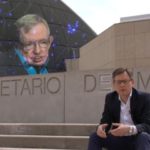BBVA Ambassadors: Pushing boundaries
Stephen Hawking was undoubtedly one of the greatest scientists in history. Steven Brown, an employee of BBVA Engineering Spain, was lucky to attend the renowned physicist’s classes at the University of Cambridge, where he learned about much more than physics.

It was 1981, and Stephen Hawking was already an esteemed scientist and the Lucasian Chair of Mathematics at the University of Cambridge. His disease, the amyotrophic lateral sclerosis that would paralyze him slowly for decades, had already had an impact on him, but "he still had his voice," recalls Steven Brown. "I was lucky to attend his classes, and I was one of the last people to hear him before he started using a synthesizer," says Steven.
Brown’s study of Mathematics was guided by his passion for the origins of the universe, which he picked up as a child. Hawking had a huge influence on him during those four years and is still one of his main sources of inspiration today. "Hawking taught us to look at the universe in a completely different way. And he did it from a small room, prostrate in a wheelchair.”
"Hawking taught us to look at the universe in a different way”
But Brown’s admiration does not end there. "Hawking was an amazing educator who managed to turn a science book into a bestseller." That ability to explain the most complex concepts with a language that anyone can understand is one of the great achievements of a brilliant mind, Brown says.
A unique scientist
While Steven Brown studied at Cambridge, Hawking wrote: “Ideas about cosmology have changed greatly in the last 60 years. At the beginning of this century it was accepted without question that the universe was essentially uniform and static. […] Most people preferred to believe that the universe had existed for ever because this avoided awkward questions about the initial data and about what happened before the beginning.” He was referring to the Big Bang theory, which was gaining acceptance at the time, and his work responded to many of the doubts and questions people had about this concept.
"Represents the values of overachievement and commitment... And he is an example of thinking big"
It was this contribution to science that made the panel of the 8th BBVA Foundation Frontiers of Knowledge Awards two years ago decide to give Hawking the Basic Sciences award, along with Viatcheslav Mukhanov from the University of Ludwig-Maximilians.
"Professor Hawking represents the values of hard work, overachievement, creativity, and above all, commitment to the advancement of knowledge. His research on the universe and the formation of galaxies have underpinned the study of cosmology," said BBVA Foundation president Francisco González at the award ceremony.

Agujero negro
A very special honor
Hawking was "particularly proud of this award," explains Steven, because "it was the first time that his research in the field of galaxy formation was recognized," as the physicist himself said in his acceptance speech.
“There are big questions that need an answer, and there is also a new generation of interested and committed people and with a new vision of science. How will we feed a growing population, how will we provide water and generate renewable energy, how will we slow down climate change? I hope that science and technology give us the answer. But it will take people, human beings with the knowledge and vision necessary to apply the solutions," Hawking said.
Steven Brown says the most important thing Hawking has taught us, apart from his ability to overcome all kinds of difficulties, is his definition of intelligence—“the ability to adapt to change.” Brown believes that a background in mathematics is not very common in a bank. "But the good thing about BBVA is that even though we are very different people, we all work as one team, and that makes us bigger than the sum of each person," Brown said. We are constantly evolving: "The bank has changed a lot in these sixteen years. Now we are much more technological, and I think that working here is a great opportunity for a mathematician in this digital age."
Steven Brown remembers each of his encounters with Hawking, but what has stuck with him the most is Hawking’s constant struggle to overcome the limits of his illness, the universe, and established knowledge and science. Steven Hawking definitely thought big.